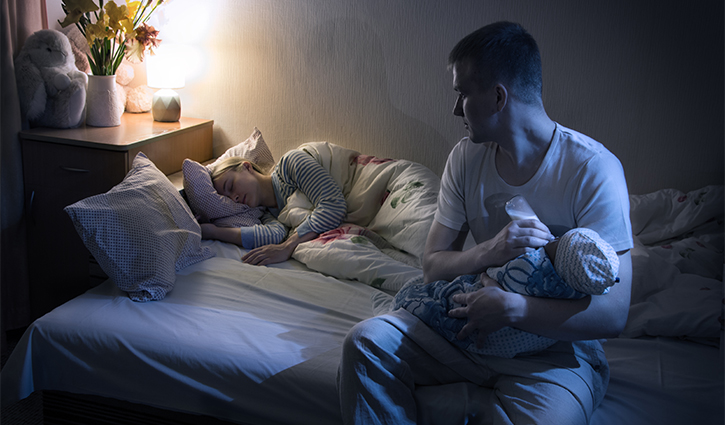

Compared with any other stage of their lives, women are more likely to develop mental health conditions in the months after their baby is born, with postpartum depression affecting 1 in 7 new mothers.
Despite the available information, the recommended and accessible screening for depression, the therapies, and prescribed medications, new mothers cannot possibly be expected to overcome an often-debilitating mental health condition on very little sleep.
Researchers have investigated the association between depression and sleep quality, and in this study, for example, they found that the chance of depression for sleep-deprived mothers was over 3 times higher than for those with good sleep quality.
Babies don’t have sleep problems. Society does.
It’s biologically healthy, beneficial, and normal for newborns to wake frequently. From an evolutionary perspective, their survival depends on it.
The problem is that new parents in Western societies don’t have the same social support that they once did. There’s usually no ‘village’ to help respond to the baby’s needs, day and night, while the mother rests and recovers from the birth.
In the majority of families, the primary caregiver is the birth parent. Because her role holds less value, according to our patriarchal, capitalist culture, she is usually expected to care for the infant’s needs overnight (plus the invisible work within the home).
Improving maternal sleep is vital
This narrative has to change, particularly if mothers are to have a chance at avoiding or treating postpartum depression.
Maternal sleep must be protected at all costs. Alarmingly, suicide is one of the leading causes of death for new mothers.
Supporting a new mother’s wellbeing, and therefore her whole family’s health and wellbeing, depend on her getting more sleep.
How new mothers can get more sleep
If a partner or family member can help a new mother to get longer stretches of sleep at night, they could potentially treat or prevent postpartum depression. Every family member benefits when this happens. The partner also gets more opportunities to bond with their baby, which is so important, particularly if they haven’t seen them all day. Here is how a new mother can get more sleep:
- Halve the wakes: The mother only does the night feeds if they’re breastfeeding, and the partner does the nappy changes and resettling so that the mother can go straight back to sleep. If the parents are bottle-feeding, they can take it in turns.
- Reverse sleep-in: The mother goes to bed early while the partner stays up, cuddling the baby while they sleep until the first feed of the night.
- Split the nights: For bottle-fed babies, the mother can sleep for the first half of the night while the partner attends to the baby, and then she takes over so the partner can sleep for the second half.
- Mornings off: One caregiver can parent in the morning while the other sleeps in. This could be weekdays before the parent who works outside the home spends some time with the child, or taking it in turns on the weekends.
- Prioritise sleep over everything: Resting and napping when possible during the day will help to put something in the sleep bank. If the partner can’t help with overnight feeds, they can take over the cooking and domestic chores to allow the mother to maximise their daytime rest and care of the infant. Read How to share the parenting responsibilities after baby is born.
- Safely bedshare: Most babies sleep better in close contact with their mother. Despite it being biologically natural and the norm in most parts of the world, bedsharing has a stigma and fear attached to it in Western society. Better co-sleeping education and support is essential as it allows both the breastfeeding mother and baby to get more sleep in most cases. Read about the benefits and risk minimisation.
- A bottle isn’t necessarily the answer: Sharing baby night duty doesn’t mean that an exclusively breastfeeding mother has to introduce a bottle if she doesn’t want to. Not all babies accept a bottle anyway. Pumping can be stressful, is a lot of extra work, and sleeping through a feed could risk her milk supply.
- Or be flexible about feeding: Some mothers choose to use whatever combination of breastfeeding, expressed milk, or formula, if it allows them to get more sleep and protect their mental health. It’s advised to get the support of a lactation consultant before changing feeding patterns to minimise the risks to the milk supply and breastfeeding relationship.
- Partner can take an active role with older children: Whether it’s meals, bedtime, bathtime, or night waking for the other children in the family, the partner can be the primary support for them, leaving the mother to care for the demanding needs of their newborn.
- Outsource whatever you can: If a partner or family member does not or cannot share the baby night duty for whatever reason, outsourcing can be an option for some families. The cost of which is less than the risk to a mother’s mental health and the baby’s wellbeing. This is a list of the types of in-home newborn support services.























